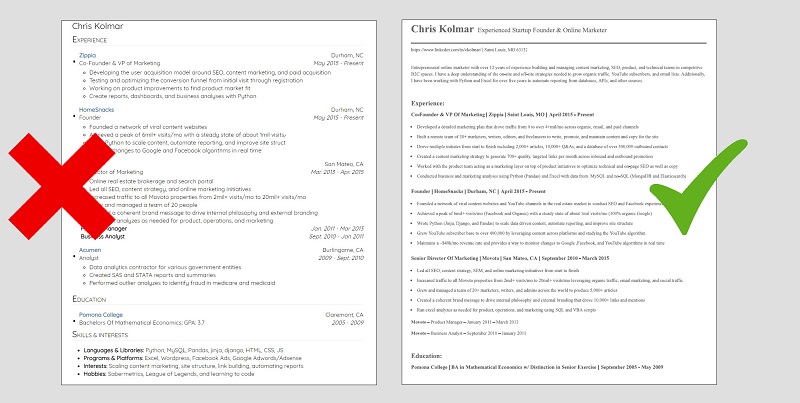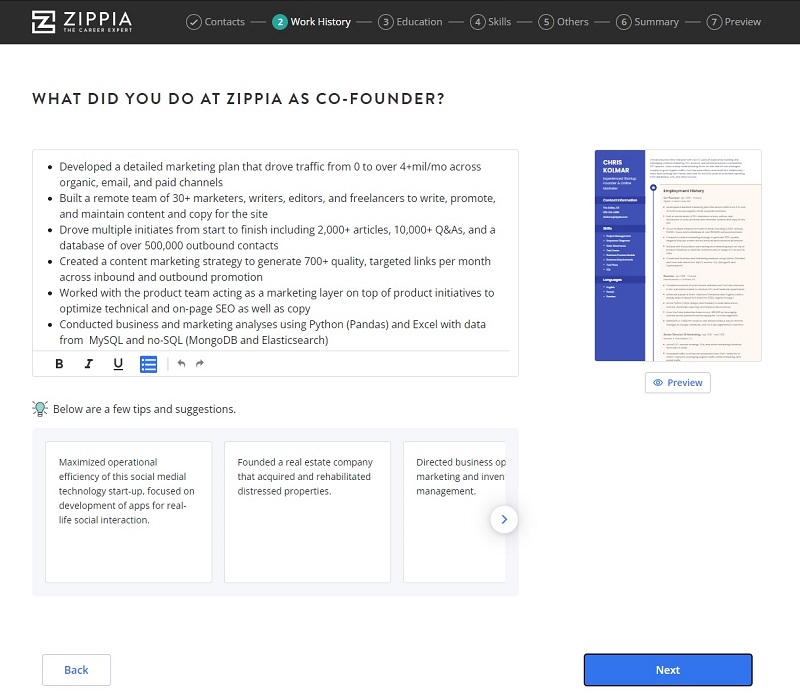- Parts Of A Resume
- How To Write A Resume
- Resume Skills Section
- Resume Objective Section
- Career Objective Section
- Resume Reference Section
- Resume Summary Section
- Resume Summary Example
- Resume Interests Section
- Address On Resume
- Relevant Work Experience
- Anticipated Graduation Date On Resume
- Education Section On Resume
- Contact Information On Resume
- Statement Of Qualifications
- How To List Publications On Resume
- Accomplishments On Resumes
- Awards On Resume
- Dean's List On Resume
- Study Abroad On Resume
- Resume Format
- Resume Templates
- General Resume Examples
- Resume Builder
- Resume Format
- Resume Margins
- Resume Header
- Work Experience On Resume
- Irrelevant Work Experience
- Listing Languages On Resume
- Volunteer Work On Resume
- GPA On Resume
- Resume Title
- Summary Of Qualifications
- Resume Picture
- Python Project On Resume
- Google Docs Resume Template
- Professional Bio On Resume
- Multiple Positions At Same Company
- Relevant Coursework Resume
- Where And How To Put Internships On Your Resume
- Professional Resume Formats
- Resume Types
- What Is Relevant Coursework on a Resume
- When to Include Relevant Coursework on Your Resume
- Update Your Resume Now To Get Your Next Job Faster
- Where to List Relevant Coursework on a Resume
- When Not to inlude Relevant Coursework on Your Resume
- How to Include Your Coursework on a Resume
- Example of Coursework Focused Resume
- Tips for Including Relevant Coursework on Your Resume
- Sign Up For More Advice and Jobs
If you are a student who is looking for and applying to jobs, you may not have enough work experience to fill up your resume. If you look online at resume templates or examples, most will have sections for work experience, skills, and education.
As a student or recent graduate, most of your impressive accomplishments happened during your time in school through clubs, activities, and your coursework.
Including relevant coursework on your resume can increase your chances of landing a job or internship, especially when you lack formal work experience.
It gives the potential employer a decent understanding of the skills you’re developing and if you’d make a good fit for the position they’re advertising. However, including your coursework on your resume should be handled delicately. Below, we discuss how to include coursework on your resume as a student or recent graduate.
Want to save time and have your resume ready in 5 minutes? Try our resume builder. It’s fast and easy to use. Plus, you’ll get ready-made content to add with one click. See 10+ resume templates and create your resume here.

One of users, Diana, had this to say:
I was guided on how to make a detailed and professional resume on Zippia. I was able to download it with unlimited access to all features.
What Is Relevant Coursework on a Resume
Relevant coursework includes any classes, projects, or academic experiences that relate to the job you’re applying for. You can include relevant course in the education section of your resume as a way of making up for your lack of formal work experience.
Not all of your college classes are particularly relevant for many entry-level positions. For example, someone applying for an accounting role shouldn’t bother including their philosophy class.
Relevant coursework should usually follow the basic information about the school (university name, anticipated graduation date, major) and any other optional academic topics you feel will improve your candidacy (Dean’s List, awards, honors, etc.)
When to Include Relevant Coursework on Your Resume
Relevant coursework refers to the list of subjects and classes you have taken or are currently taken at a school that is related to the job you’re applying for. So, when should you include this type of information on a resume? The following situations are appropriate instances to include relevant coursework on your resume:
-
You are a recent graduate or will be graduating soon. When you’re getting ready to enter the workforce or are preparing a resume for graduate school, including relevant coursework is a must.
You have likely spent the last few years studying, attending class, and completing projects and assignments. Through these tasks, you’ll have acquired various new skills that should be showcased on your resume.
-
You lack professional experience. If you’re writing a resume without work experience or related work experience, putting in related coursework will help your credibility and opportunity to snag the job.
By adding relevant coursework, you’ll show your potential employer that you have important knowledge related to the position, even if you don’t have workforce experience.
-
You want to change careers, and your coursework is relevant. A career change is a big move for any professional, and depending on where you’re moving, you may have minimal experience or skills from your work experience to highlight. In this case, it’s relevant to mention your coursework.
Update Your Resume Now To Get Your Next Job Faster

Where to List Relevant Coursework on a Resume
Relevant coursework beneath the education heading. Remember, highlight only the information that is relevant to the position you’re applying for. In some cases, especially when you highlight relevant skills or abilities, your information might make sense in a different place on your resume.
It’s important to remember that all resumes will look different based on your experience level and what kind of job you’re applying for. Be sure to tailor your resume in a way that’s right for you and your future career goals.
When Not to inlude Relevant Coursework on Your Resume
If you’re uncertain about when to include or exclude coursework on your resume, there are a few things you might want to keep in mind. The following instances may be applicable when considering leaving your coursework off your resume:
-
Your resume is already a page long. If you have enough work experience, skills, and education to fill up an entire page of your resume, it’s probably best to leave coursework off, even if it is relevant
There is no need to go out of your way to include additional coursework unless you received a special certification that would be important for the employer to know.
-
The coursework is outdated. If it’s been some time since you have been in school and the coursework is outdated, it might be best to leave the specifics off your resume.
For example, some marketing courses can become quickly outdated with how quickly the digital landscape shifts. If the coursework is too outdated to be relevant to the position, adding it to your resume may do more harm than good.
-
Your coursework is not relevant to the position. Of course, if the coursework isn’t immediately relevant to the job you’re applying for, it’s better to leave it off. If it comes up as an opportunity during your interview, feel free to bring it up there.
Then again, there’s one more thing you can do.
Make a new resume and get more interviews.
Plus, a great resume will give you an advantage over other candidates. You can write it in our resume builder here. Here’s what it may look like:
How to Include Your Coursework on a Resume
Depending on the amount of coursework you have, you’ll have a few different ways to include this coursework on your resume. This can include a column format or a detailed format.
Depending on the amount of information already on your resume and how relevant the details of your coursework are for the position, you’ll need to alter how you list this information. Unless you have a very bare resume, it’s a good idea to consider the single-column format or the multi-column format.
Below are the different ways to include relevant coursework on your resume:
-
Single-column format. The single-column format displays your relevant coursework in a list form with bullet points. Here, you’ll list the relevant class title you’re looking to highlight and no additional information.
-
Multi-column format. If you have multiple skills you’re looking to highlight that fit into different categories, you can consider the multi-column format. Each column should have a different header (such as; Marketing or English) with the relevant courses listed beneath.
-
Detailed format. The detailed format is more in-depth than just using the title of the course. It provides more specifics on the skills you may have learned in each specific course. This format will look more like the format you’re used to seeing under the work experience section of a resume.
In this format, you’ll give the course, school, dates, and a few bullet points beneath that help to highlight the learnings you’ve gleaned from your time in this course. If you decide to use this kind of format, take extra care to only include skills that are relevant to the job at hand.
An excellent trick to use is to look over the job search announcement for any keywords that can help your resume stand out.
As you work through what coursework to include and how to format it appropriately, you’ll also need to decide on the appropriate place to put it. If it’s a supplement to the rest of your resume, you can consider adding it at the end.
However, if it’s the most impressive part of your resume, you can consider placing it more towards the top so that the employer sees it at first glance. In certain circumstances, it’s appropriate for your relevant coursework to replace the work experience section.
Example of Coursework Focused Resume
So how exactly should this look on your resume? As mentioned above, it will differ depending on the individual, the amount of existing information on your resume, and the relevant coursework you’re able to share. Below are a few examples of ways to include your relevant coursework on your resume.
-
Single-column format:
Master of Science in Learning Technologies
Pennsylvania State University
Completion: 2014Related Classwork:
-
Cloud Computing in the Digital Age
-
Integrating Social Media in Online Learning Environments
-
Learning Technologies Foundations and Applications
-
-
Multi-column format:
Bachelor’s in Information Technology
Saint Joseph’s University
Completion: 2015Related Coursework:
Information Technology-
Application Development: Developed coding skills for web development.
-
Networking and Telecommunications: Studied transmission media, packet switching and routing, and cybersecurity.
Artificial Intelligence and Machine Learning
-
Artificial Intelligence and Machine Learning: Researched the relationship between AI and machine learning, its impact on business processes, and sales and marketing teams.
-
Artificial Intelligence Implications for Business Strategy: Gained knowledge to support AI integrations into existing organizations to make strategic business decisions.
-
-
Detailed Format:
Bachelor’s in Marketing
Rowan University
Completion: 2017Related Coursework:
-
Business to Business Marketing
-
Deep comprehension B2B marketing tactics, including digital campaigning, paid advertising, public relations, and content creation.
-
Studied the relationships and nuances between businesses and how receptiveness to marketing is altered in comparison to B2C.
-
-
-
Fostered relationships with editors, create pitch emails and articles, and how to best process a press release over the wire.
-
Execute a public relations campaign from editorial relationships, press releases, by-line articles, and event promotion.
-
-
Principles of Marketing
-
Practiced the fundamentals of marketing, including data analysis, copywriting, buyer personas, and more.
-
Developed and execute a full marketing plan.
-
-
-
Tailor your resume for the job. Regardless of where you are in your career, this is the golden rule of resume-writing. The definition of “relevant” changes depending on what the job description looks like.
On top of that, the exact language you choose to describe your coursework might need to be tweaked. For example, maybe you studied a few analytics platforms in school. If the job description emphasizes Google Analytics then that’s the part of your coursework that you should highlight.
-
Give more educational details. If you’re opting to include coursework, you should also include brief mentions of other educational achievements.
For example, listing a high GPA (3.5+), a Latin honor, a published thesis, or any other award that speaks to your excellence can help show that you not only took relevant courses, but excelled in them.
-
Be explicit about skills. Your resume will also have a skills section that’s ripe for hitting keywords that applicant tracking systems (ATS) love to see. But an advantage of including relevant coursework is that you can also include even more skills.
Plus, you can repeat the important keywords from your skills section, ensuring that the reader sees exactly what you have to offer.
-
Edit continually. Everyone should update their resume often, but nobody should do it more often than students and recent graduates. As a freshman, it’s fine to include some basic courses, but each year brings more difficult (and therefore more impressive courses) that should take precedence over your earlier studies.
As you start to get formal work or internship experience, you can start to cut back on how much coursework you include, as it becomes less and less important as your career progresses.
Tips for Including Relevant Coursework on Your Resume
- Parts Of A Resume
- How To Write A Resume
- Resume Skills Section
- Resume Objective Section
- Career Objective Section
- Resume Reference Section
- Resume Summary Section
- Resume Summary Example
- Resume Interests Section
- Address On Resume
- Relevant Work Experience
- Anticipated Graduation Date On Resume
- Education Section On Resume
- Contact Information On Resume
- Statement Of Qualifications
- How To List Publications On Resume
- Accomplishments On Resumes
- Awards On Resume
- Dean's List On Resume
- Study Abroad On Resume
- Resume Format
- Resume Templates
- General Resume Examples
- Resume Builder
- Resume Format
- Resume Margins
- Resume Header
- Work Experience On Resume
- Irrelevant Work Experience
- Listing Languages On Resume
- Volunteer Work On Resume
- GPA On Resume
- Resume Title
- Summary Of Qualifications
- Resume Picture
- Python Project On Resume
- Google Docs Resume Template
- Professional Bio On Resume
- Multiple Positions At Same Company
- Relevant Coursework Resume
- Where And How To Put Internships On Your Resume
- Professional Resume Formats
- Resume Types





